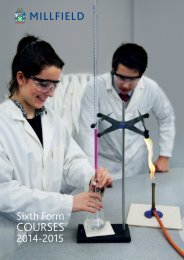COURSES
Create successful ePaper yourself
Turn your PDF publications into a flip-book with our unique Google optimized e-Paper software.
Psychology<br />
Individual Differences focuses on the development<br />
of debilitating conditions, such as phobias and<br />
obsessive compulsive disorder (OCD), as well as the<br />
effectiveness of treatments.<br />
A2<br />
Unit 3: Child Development.<br />
Cognitive Development through childhood into<br />
adulthood concentrates on the influential work of<br />
Jean Piaget, Lev Vygotsky as well as more recent<br />
research.<br />
Cognition & Law examines how effectively<br />
experimental psychology has informed police<br />
practice when interviewing witnesses and identifying<br />
faces, as well as the ethical and legal issues<br />
surrounding false memories.<br />
In Forensic Psychology, the nature of the offender<br />
and criminal profiling are considered alongside the<br />
effectiveness of punishments and therapies.<br />
Unit 4: Approaches, Debates and Methods<br />
in Psychology.<br />
The six main approaches in psychology,<br />
(Psychodynamic, Behaviourist, Social Learning,<br />
Humanistic, Cognitive, and Biological), are compared<br />
in depth and used to interpret materials from all the<br />
AS/A2 modules. Discussion of whether psychology is<br />
a science is also informative in developing arguments<br />
about central debates into holism vs. reductionism<br />
or nature vs. nurture, for example.<br />
By this stage, pupils are expected to be able to<br />
develop research proposals independently, selecting<br />
appropriate methods and taking into consideration<br />
the many factors that can influence the results of<br />
psychological investigations.<br />
Further information<br />
Psychology is a very flexible subject, and the AQA<br />
specification studied is considered to be the most<br />
scientific of all the specifications available. For many<br />
pupils studying arts subjects, it has proven to be a<br />
very practical and useful gateway to thinking critically<br />
about science. In the past, pupils have appreciated its<br />
topic links with biology, law, physical education and<br />
philosophy, but also the comprehensive grounding in<br />
Theories of Science and Empirical Analysis.<br />
Psychology is valued at university for the breadth<br />
of scientific and analytical writing skills that are<br />
developed, although it is not required for entry to<br />
any degree. A level Psychology is considered as an<br />
appropriate subject in any combination for any<br />
course requiring three A level entries. Psychology<br />
remains one of the most popular courses at<br />
university, and it underpins other courses, such as<br />
Child Development, Marketing, Criminology and<br />
Neuroscience. Sports Science is also a popular<br />
choice for Millfield pupils.<br />
Essential GCSE Grades: Grade B in Additional<br />
Science (or the equivalent overall level in separate<br />
Biology, Chemistry and Physics).<br />
Desirable GCSE Grades: Grade B in Mathematics<br />
Exam Board: AQA Psychology Specification B<br />
The specification numbers are:<br />
1186 (AS); 2186 (A2)<br />
Full course details can be found at:<br />
www.aqa.org.uk<br />
For further information please contact:<br />
i/c of Psychology, Dr G B Smith,<br />
gbs@millfieldschool.com<br />
Millfield Sixth Form Courses 2014-2015 79



